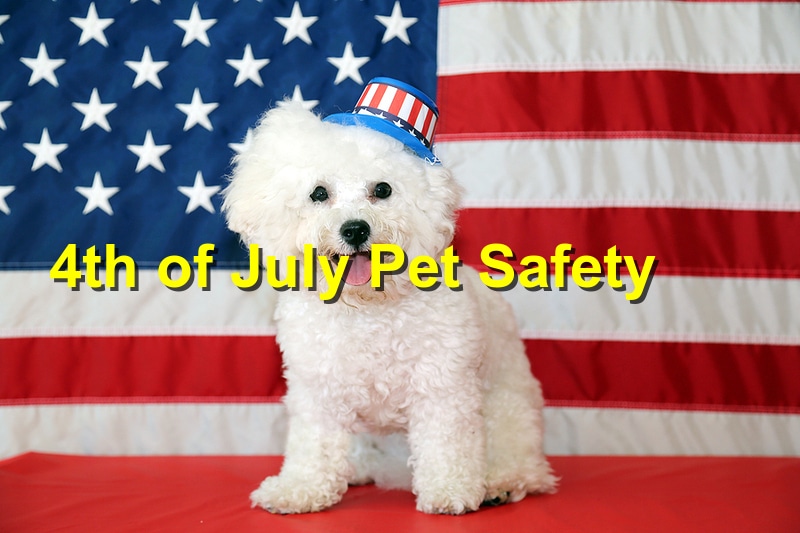4th of July Pet Safety: Protecting Your Pets from Fireworks

The 4th of July is a festive time filled with barbecues, parades, fireworks, and outdoor fun. But for pets, this summer holiday can be one of the most stressful—and dangerous—days of the year. Loud fireworks, large crowds, extreme heat, and tempting but toxic party foods can all spell trouble for your dog or cat.
Every year, animal shelters report a spike in lost pets around the 4th of July, many of whom ran away in fear during fireworks displays. In addition, the heat of summer can make outdoor activities unsafe, especially when proper precautions aren’t taken.
To keep your furry friend safe and comfortable, it’s important to plan ahead. Here's how to protect your pet from the dual dangers of fireworks and summer heat this Independence Day.
1. Fireworks: Fear and Safety Hazards
While we may love a good fireworks show, most pets do not. The loud noises, flashes, and vibrations can trigger anxiety, panic, and even physical harm.
Why pets fear fireworks:
- Sudden loud noises startle them
- They don’t understand what’s happening
- Their hearing is more sensitive than ours
Dangers of fireworks to pets:
- Running away or escaping from the yard
- Injuries from lit fireworks or debris
- Increased anxiety, pacing, hiding, or destructive behavior
How to protect your pet:
- Keep them indoors well before fireworks start.
- Create a safe space like a quiet room with familiar bedding, toys, and background noise (TV or calming music).
- Close windows and curtains to muffle the sound and block flashes.
- Avoid taking pets to fireworks displays.
- Stay calm and comforting, but don’t overreact to their fear—it can reinforce the behavior.
- Talk to your vet about anti-anxiety medications or natural calming aids if your pet is especially nervous.
2. Summer Heat: Hidden Holiday Danger
In many parts of the country, the 4th of July falls during peak summer heat. While you’re enjoying the sun and barbecues, your pet may be struggling to stay cool.
Watch out for:
- Heatstroke: Can develop quickly and be fatal
- Burned paw pads: Hot pavement and sand can cause injury
- Dehydration: Especially during long outdoor events
Signs of heat-related distress:
- Heavy panting
- Excessive drooling
- Vomiting or diarrhea
- Weakness or collapse
Tips to beat the heat:
- Keep pets inside during the hottest hours (10 AM – 4 PM)
- Provide access to shade and plenty of fresh water
- Use cooling mats or fans indoors
- Avoid hot pavement or surfaces
- Never leave pets in a parked car, even with the windows cracked
3. Food and Drink Dangers
Holiday foods and drinks can be tempting for pets, but many are unsafe—or even toxic.
Keep pets away from:
- Alcohol: Even small amounts can be toxic
- Chocolate and desserts: Especially those with xylitol
- Bones and greasy leftovers: Can cause choking or pancreatitis
- Corn on the cob, onions, grapes, and garlic
Ask guests not to feed your pet and ensure trash cans are covered or out of reach.
4. Lost Pet Prevention
The 4th of July is one of the most common days for pets to go missing. Frightened pets may break through fences, slip out doors, or run far from home.
Prevent escapes by:
- Double-checking gates, doors, and windows before the fireworks begin
- Using a secure collar with up-to-date ID tags
- Microchipping your pet and ensuring your contact info is registered
- Keeping pets leashed when taking them outside, even for potty breaks
If your pet does get lost, a microchip and visible ID significantly increase the chances of a safe return.
5. Prepare an Emergency Pet Safety Kit
Whether you're hosting a backyard BBQ or heading to a family party, be ready with pet essentials in case of emergency.
Include:
- Bottled water and a travel bowl
- Medications and calming treats
- First aid supplies
- Copies of vaccination and medical records
- A recent photo of your pet
Also, know the contact info of the nearest emergency vet clinic—just in case.
6. Bonus Tip: Exercise Earlier in the Day
Get your pet's energy out with a walk or play session before the heat and noise ramp up. This can help reduce restlessness later and make it easier for them to settle during the fireworks.
Conclusion: Celebrate Safely with Your Pet
While the 4th of July is a time for celebration, it’s important to keep your pet’s safety and comfort in mind. Fireworks and heat pose real risks, but with preparation and attention, you can prevent emergencies and help your pet feel secure.
By planning ahead, creating a calm environment, and keeping your pet cool and comfortable, you can enjoy the holiday knowing you’ve done your part to keep them happy and safe. After all, your pet is part of the family—and they deserve to enjoy the celebration, too.
References: MedVet
Comments
Post a Comment